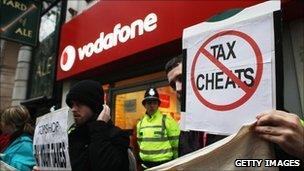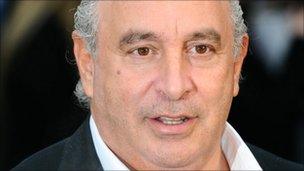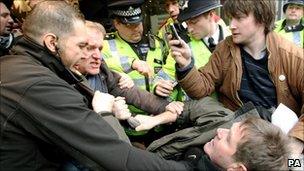Should companies offer to pay more tax?
- Published

UK Uncut supporters have already held a series of protests across the UK
Flash mobs, sit-ins and superglue stick-ons are not usually events you would associate with the rather staid world of corporate taxation.
But this weekend in towns across the UK tax protesters will be employing these tactics in their campaign against what they claim is widespread tax evasion.
The event has been branded Pay Day and has been organised by a group of activists under the banner of UK Uncut.
Their list of targets reads like a Who's Who of some of Britain's biggest companies, with Vodafone, Barclays and Topshop all expecting a visit from the group's army of campaigners.
Formal lobbying for tax reform in the corridors of power has been replaced by a self-styled "tax enforcement society" marching from shop to shop disrupting their trade.
The source of their anger is the coalition government's programme of budget cuts, many of which the group say are unfair.
But instead of storming the Treasury, they are targeting companies and individuals they feel are evading their "fair share" of tax.
In all the talk of "broadest shoulders bearing the greatest burden" in cutting the budget, UK Uncut sees its corporate targets as the real enemy.
Monaco
"People across the country are getting involved in the campaign, because it's an issue that people believe in," says Daniel Garvin, one of the leaders of UK Uncut.

Sir Philip Green, owner of fashion retailer Arcadia, is one of UK Uncut's targets
He insists that the group is not intent on using violence in its campaign, but previous protests resulted in campaigners being removed by police from a Topshop store in Birmingham, and allegations of punch-ups on both sides.
With Twitter and Facebook buzzing with expectation about the weekend's events, retailers are gearing themselves up for another busy weekend.
So who's right in the argument over moral taxation?
Brash, confident and very rich - it's not surprising that UK Uncut has chosen Sir Philip Green as the poster boy of the campaign.
Their claim is not that he's done anything illegal, but that by "dodging tax" he's also evading his moral responsibility to the country in which he makes most of his money in.
Despite the fact that Sir Philip is the figurehead for Arcadia's retail empire, it's his wife, Tina, who actually owns the business - nothing illegal there, many say.
But it's the fact that Mrs Green lives in the tax haven of Monaco that has attracted the ire of the protesters.
Sir Philip points out that his companies' contribution to the UK economy is hardly inconsiderable: £71m of corporation tax last year, employment for 44,000 people, with an annual employment cost in excess of £500m.
'Medieval times'
To many in the business world, Sir Philip is already paying his dues, and if he manages to keep some of his profits out of the taxman's coffers, then that's his choice.
"The idea of a moral tax bill does trouble me," says John Whiting of the Chartered Institute of Taxation.
"This is not like medieval times when the tax authority would come round and tell you how much you owed - these days there are rules set by HMRC," he says.
But playing by the rules and not their "spirit" is what has motivated many to join the protests.
"How can it be fair to close libraries, sack public sector workers and hike up student fees while there are people who are exploiting loopholes and not paying their way in this country," says Mark Serwotka, head of the Public and Commercial Services Union.
"It's about the type of morals that I would like to see in this country, and it's about trying to solve our financial difficulties by concentrating on taxing those who can most afford it," he adds.
The union has also voiced concerns that government cuts in the civil service will rob HMRC of much of its power to pursue those it thinks owe tax.
Scrutinised
From humble beginnings in a small town in Berkshire to one of the world's biggest mobile phone companies, Vodafone is one of the UK's most successful companies - and now one of the most scrutinised.
As UK Uncut's second favourite target, the company is getting used to crowds of protesters swarming into its stores demanding it pay £6bn to the government.

The protesters say their campaign is peaceful, but there have been scuffles
UK Uncut claims the company owes the money in unpaid taxes - something that the company and the tax authorities flatly deny.
HM Revenue & Customs says that there was a "rigorous examination of the facts and an intensive process of negotiation" which ended up with Vodafone paying £1.25bn in July.
"There is no question of Vodafone having an outstanding tax liability of £6bn. That number is an urban myth," according to its statement.
'Tax fairness'
None of this will make much impression with the protesters this weekend, who will be campaigning up and down the country.
With more budget cuts on the way, it's unlikely that the campaigners are going to scale back their protests for "tax fairness".
But it's even less likely that Vodafone and Sir Philip Green will be turning up at a tax office any time soon with bundles of cash to satisfy UK Uncut's demands.
The only people who might allow themselves a sigh of relief this Christmas are the bankers, who have at least been temporarily supplanted as the villains of the recession.
- Published4 December 2010
- Published30 October 2010